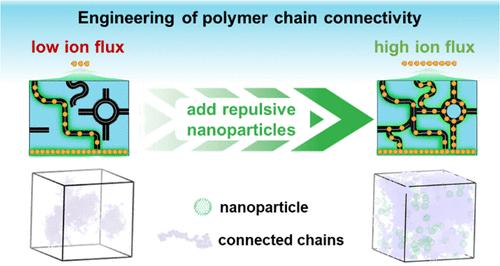Beyond Composition: Optimizing Ion Transport in Solid-State Composite Polymer Electrolytes through Pathway Engineering
IF 15.6
1区 化学
Q1 CHEMISTRY, MULTIDISCIPLINARY
引用次数: 0
Abstract
Composite polymer electrolytes (CPEs), composed of a polymer matrix and inorganic nanoparticles, are promising for solid-state batteries. While most studies focus on compositional factors such as filler type and polymer structure, mesoscale connectivity between polymer coordination sites represents a crucial, yet underexplored, factor influencing ion transport. Here, using coarse-grained Monte Carlo simulations, we explored how coordination site connectivity governs transport. The polymer chain connectivity is quantified as a proxy for coordination site connectivity, and we found that repulsive nanoparticles enhance chain connectivity, particularly at high weight ratio and strong repulsion. Structural analysis shows that this enhancement extends throughout the polymer. These predictions were validated experimentally using CPEs composed of poly(ethylene oxide) and silica nanoparticles of tunable surface chemistry. CPE with strong repulsive silica nanoparticles exhibited improved room-temperature ionic conductivity by up to 5-fold and a significant reduction in effective activation energy under a suboptimal condition. Our findings demonstrate that connectivity restructuring critically enhances ionic transport, offering a new design paradigm for CPEs based on mesoscale connectivity control.

超越成分:通过途径工程优化固态复合聚合物电解质中的离子传输
由聚合物基质和无机纳米颗粒组成的复合聚合物电解质(cpe)在固态电池中具有广阔的应用前景。虽然大多数研究都集中在填料类型和聚合物结构等组成因素上,但聚合物配位位点之间的中尺度连通性是影响离子传输的关键因素,但尚未得到充分研究。在这里,我们使用粗粒度蒙特卡罗模拟,探讨了协调站点连接如何管理传输。聚合物链连通性被量化为配位位点连通性的代表,我们发现排斥性纳米颗粒增强了聚合物链的连通性,特别是在高质量比和强排斥性的情况下。结构分析表明,这种增强延伸到整个聚合物。这些预测在实验中得到了验证,实验中使用了表面化学可调的聚环氧乙烷和二氧化硅纳米颗粒组成的cpe。具有强排斥性二氧化硅纳米颗粒的CPE在室温下的离子电导率提高了5倍,在次优条件下有效活化能显著降低。我们的研究结果表明,连通性重组极大地增强了离子输运,为基于中尺度连通性控制的cpe提供了一种新的设计范式。
本文章由计算机程序翻译,如有差异,请以英文原文为准。
求助全文
约1分钟内获得全文
求助全文
来源期刊
CiteScore
24.40
自引率
6.00%
发文量
2398
审稿时长
1.6 months
期刊介绍:
The flagship journal of the American Chemical Society, known as the Journal of the American Chemical Society (JACS), has been a prestigious publication since its establishment in 1879. It holds a preeminent position in the field of chemistry and related interdisciplinary sciences. JACS is committed to disseminating cutting-edge research papers, covering a wide range of topics, and encompasses approximately 19,000 pages of Articles, Communications, and Perspectives annually. With a weekly publication frequency, JACS plays a vital role in advancing the field of chemistry by providing essential research.

 求助内容:
求助内容: 应助结果提醒方式:
应助结果提醒方式:


